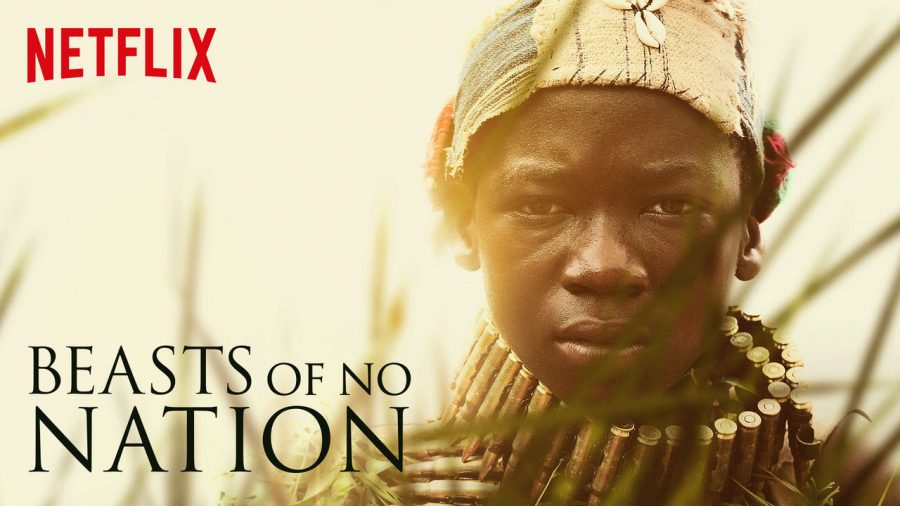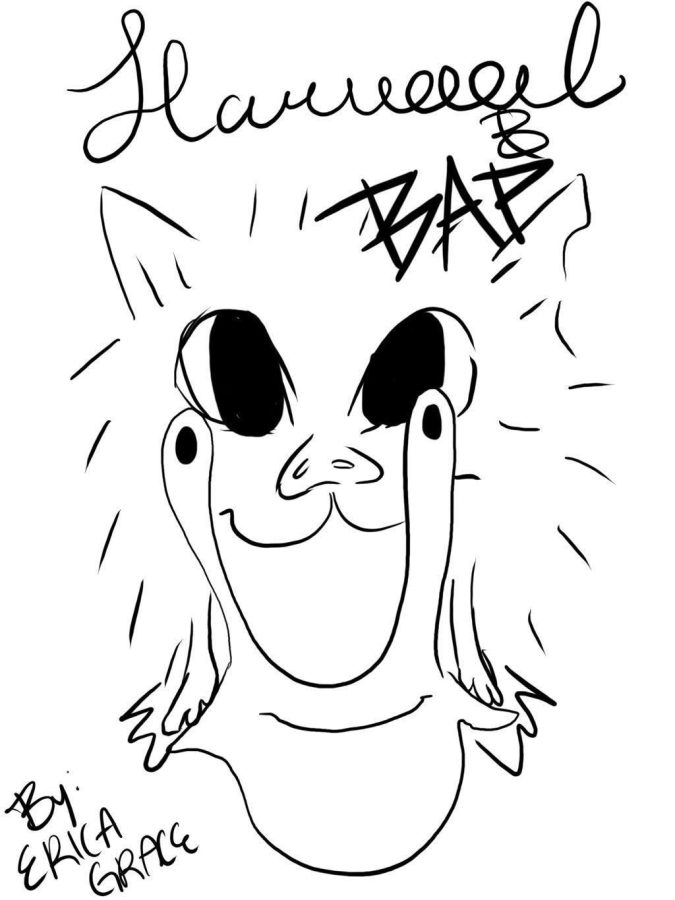By Siddharth Jejurikar ’16, Entertainment Editor
The vibrant flora of an African jungle, dream-like colors painting the landscape, and blood—endless blood—drowning the ground. These are typical set pieces in Cary Joji Fukunaga’s new Netflix film, Beasts of No Nation. Fukunaga, known most for his directive work on the first season of True Detective, tackles the atrocious nature of the use of child soldiers in war. The film uses a surrealist style to paint a realist picture of the nature of war and the state of the world we live in. It devastates while giving hope, disgusts while entrancing, and speaks the truth through a fictional story. Rarely do I watch a movie that forces me to stop and leave the room because what I had witnessed was too much. The fact that Beasts of No Nation moved me to this point puts it in the echelon of A Clockwork Orange (1971) and Trainspotting (1996). Utilizing excellent acting work from Abraham Attah and Idris Elba as well as a unique directive style, Beasts of No Nation marks itself as a powerful work—one that will hopefully be a rallying cry for change.
Beasts of No Nation doesn’t take place in any known country or follow any real historical conflict, instead relying on sparse context clues to signify to its viewers that the location of the war does not matter. The film achieves this goal beautifully, proving that the story of Agu (Abraham Attah) and the Commandant (Idris Elba) is one that can and should be applied everywhere. Not only that, but the film also shows that wartime atrocities are committed by every side of a conflict; that, regardless of one’s side, portions of their army are savage and greedy, caring little for the lives of those caught in between.
The film identifies three major political groups: the government military, the PLF rebel army, and the Native Defense Force. The NDF is a radical isolationist rebel group that finds Agu fleeing the scene of his family’s death. Completely detached from the conflict, Agu starts the film as an innocent child in a loving homing. Initially, the only Agu hears of the war is from the soldiers he sells broken TVs to and the radio’s soft mumbling in the background during dinner. When he loses his family and is emotionally vulnerable, the Commandant seizes the opportunity to capture the mind of a youth and turn him into a mindless killing machine. All the pent up hatred and anger within Agu is used by the opportunistic Commandant, who gives his child army the one thing they need: the feeling of family. He trains his soldiers, makes them feel like men, fighting the monsters who took their families, he gives them boldness and confidence, but he steals their innocence. It isn’t long until Agu and his comrades no longer recognize themselves or their actions; they kill innocents just like their families. Fukunaga depicts this transformation effectively, using narration and lighting as artistic tools. When Agu’s voice resonates his inner-thoughts, it is not simple narration but an insight into Agu himself. As the film progresses, the narration becomes more sparse, indicating Agu’s loss of himself. After killing his first man, an innocent university engineer, we don’t hear our protagonist’s voice until much later, when he begins to realize his situation.
Abraham Attah, playing the part of Agu, is a first-time actor from Ghana. Despite his lack of experience Attah executes a complex role with intense depth, bringing to life the terrifying story of Agu. When he needs to, he exhumes innocence and a child-like mindset, approaching the world with carelessness and ease. But just the same, his eyes can give the stare of an old man, marked by experience and hardship. Idris Elba plays the part of the Commandant, who is, frankly, an inspiring leader with a powerful personality. The Commandant’s mere voice has the power to make people fight for him. he commands with authority and strength, his soldiers fight for him with brutal loyalty, and most of all he is a monster. He preys on the young and displaced, makes them feel strong, and manipulates them for his own ends. But despite his position, he is still human. He has flaws, a sense of ego and purpose that is fragile and easily broken. Idris Elba plays this tough and incredibly nuanced character with unbelievable authenticity, embodying the nature of a great leader. An evil one, yes, but great nonetheless.
Fukunaga’s dynamic role as a cinematographer and director for this film served it well, allowing him to deliver an endless stream of powerful and moving shots. The colors on the screen depict an odd kind of perverted beauty—bleakness hiding within vibrancy. In one scene, as Agu and his NDF comrades attack a town after taking “brown-brown” (cocaine mixed with gunpowder, frequently given to children in west-African conflicts to make them more suggestible , the world around Agu turns pink. Reminiscent of photographer Richard Mosse’s work The Enclave, this scene gives weight and power to not just the war crimes happening around Agu, but his own apparent apathy to the scene. In another powerful shot, Agu walks in make-shift trenches, surrounded by death and disease. The deep reds of the high clay walls reflect and deposit into the water that Agu wades in, taking the image of blood. As he silently walks through the water, the red that surrounds him signifies how blood has become everything in his life. Even his walls and water are made of blood. Intense images like the two I have described are prevalent in Fukunaga’s style, amplifying the emotional weight of every scene.
As of the year 2000, rough estimates suggest that tens of thousands of child soldiers fight around the world today. Exploited for labor, manpower, fighting strength, and sex, children—some under ten years old—are of unfortunate prevalence on the battlefield in places like the Democratic Republic of the Congo, Afghanistan, and Chad. Even those who escape such horrible circumstances are faced with a long and arduous road to recovery, one that can only be traveled with love and understanding. Beasts of No Nation is not a movie about war, it is a movie about the people in war. It is about the men and women, the boys and girls, who die for causeless armies around the world. I highly recommend this movie to those who can stomach acutely shocking and revolting images, because it speaks a powerful and necessary message in a story needing to be told.
Image Source: Netflix






